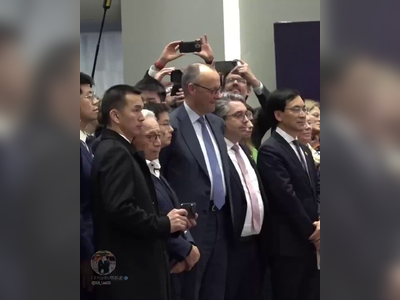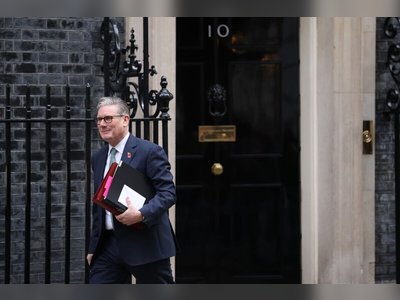Controversy Surrounds China's Embassy Plans in Tower Hamlets Amid Security Concerns
UK government officials push forward embattled embassy plan despite local opposition and security risks.
China's ambitious proposal to construct a massive new embassy complex in Tower Hamlets, London, has ignited a heated debate involving high-level government interventions and public outcry.
Home Secretary Yvette Cooper and Foreign Secretary David Lammy have voiced support for the controversial project, which has faced opposition from local residents and security concerns from the Metropolitan Police.
The plans to develop the embassy on the site of the former Royal Mint—a property the Chinese government acquired seven years ago—have been labeled as one of the most contentious planning applications in recent history.
The embassy, slated to become one of the largest in the world, has attracted close scrutiny due to its proximity to significant infrastructure, including critical communication cables, which intelligence services fear may be vulnerable to espionage or attacks.
This week, Cooper and Lammy conveyed their backing in a joint letter to the Planning Inspectorate, emphasizing the diplomatic necessity for nations to maintain operational embassies in each other's capitals.
The letter, as reported by the Evening Standard, revealed that despite earlier objections, the Metropolitan Police had withdrawn their stance against the proposal.
The withdrawal came after assurances that sufficient space would be available to accommodate potential protests without disrupting local transport routes.
Nonetheless, the proposal has faced formidable opposition from local officials and residents.
Tower Hamlets councillor Peter Golds criticized the government's intervention as an "extraordinary attempt to influence an independent inquiry" and expressed concerns over potential misinformation and the project's impact on the surrounding area.
The embassy site is adjacent to significant heritage landmarks, including the Tower of London, and sits near the financial district of the City of London.
In their correspondence, Cooper and Lammy also suggested modifications to the access plans for the site's historic features, proposing controlled public access with diplomatic oversight instead of unrestricted entry.
Such measures, they argued, could mitigate potential delays in emergency response times due to the complex's intended diplomatic status.
The timing of this intervention is notable, as it occurred shortly after Chancellor Rachel Reeves' diplomatic visit to China aimed at strengthening economic ties between the two countries.
This followed Foreign Secretary Lammy's earlier visit, highlighting the strategic importance of Sino-British relations amidst growing geopolitical tensions.
Locally, the proposal has elicited strong reactions, particularly given the socio-demographic composition of Tower Hamlets, which has the highest concentration of Muslim residents in the UK. Community protests have pointed to China's human rights record, specifically its treatment of Muslim Uyghurs, amplifying the embassy's unpopularity among residents.
Despite planning officers initially advising approval based on architectural merits, the Tower Hamlets council, supported by Mayor of London Sadiq Khan, rejected the application in February 2023. The decision appeared definitive until China re-submitted its plans last August, leading the Ministry of Housing, Communities, and Local Government to take over the decision-making process, further complicating the affair.
As the situation evolves, the proposed embassy remains a focal point of contention, juxtaposing diplomatic imperatives against local governance and community values within the broader global context.
Home Secretary Yvette Cooper and Foreign Secretary David Lammy have voiced support for the controversial project, which has faced opposition from local residents and security concerns from the Metropolitan Police.
The plans to develop the embassy on the site of the former Royal Mint—a property the Chinese government acquired seven years ago—have been labeled as one of the most contentious planning applications in recent history.
The embassy, slated to become one of the largest in the world, has attracted close scrutiny due to its proximity to significant infrastructure, including critical communication cables, which intelligence services fear may be vulnerable to espionage or attacks.
This week, Cooper and Lammy conveyed their backing in a joint letter to the Planning Inspectorate, emphasizing the diplomatic necessity for nations to maintain operational embassies in each other's capitals.
The letter, as reported by the Evening Standard, revealed that despite earlier objections, the Metropolitan Police had withdrawn their stance against the proposal.
The withdrawal came after assurances that sufficient space would be available to accommodate potential protests without disrupting local transport routes.
Nonetheless, the proposal has faced formidable opposition from local officials and residents.
Tower Hamlets councillor Peter Golds criticized the government's intervention as an "extraordinary attempt to influence an independent inquiry" and expressed concerns over potential misinformation and the project's impact on the surrounding area.
The embassy site is adjacent to significant heritage landmarks, including the Tower of London, and sits near the financial district of the City of London.
In their correspondence, Cooper and Lammy also suggested modifications to the access plans for the site's historic features, proposing controlled public access with diplomatic oversight instead of unrestricted entry.
Such measures, they argued, could mitigate potential delays in emergency response times due to the complex's intended diplomatic status.
The timing of this intervention is notable, as it occurred shortly after Chancellor Rachel Reeves' diplomatic visit to China aimed at strengthening economic ties between the two countries.
This followed Foreign Secretary Lammy's earlier visit, highlighting the strategic importance of Sino-British relations amidst growing geopolitical tensions.
Locally, the proposal has elicited strong reactions, particularly given the socio-demographic composition of Tower Hamlets, which has the highest concentration of Muslim residents in the UK. Community protests have pointed to China's human rights record, specifically its treatment of Muslim Uyghurs, amplifying the embassy's unpopularity among residents.
Despite planning officers initially advising approval based on architectural merits, the Tower Hamlets council, supported by Mayor of London Sadiq Khan, rejected the application in February 2023. The decision appeared definitive until China re-submitted its plans last August, leading the Ministry of Housing, Communities, and Local Government to take over the decision-making process, further complicating the affair.
As the situation evolves, the proposed embassy remains a focal point of contention, juxtaposing diplomatic imperatives against local governance and community values within the broader global context.











